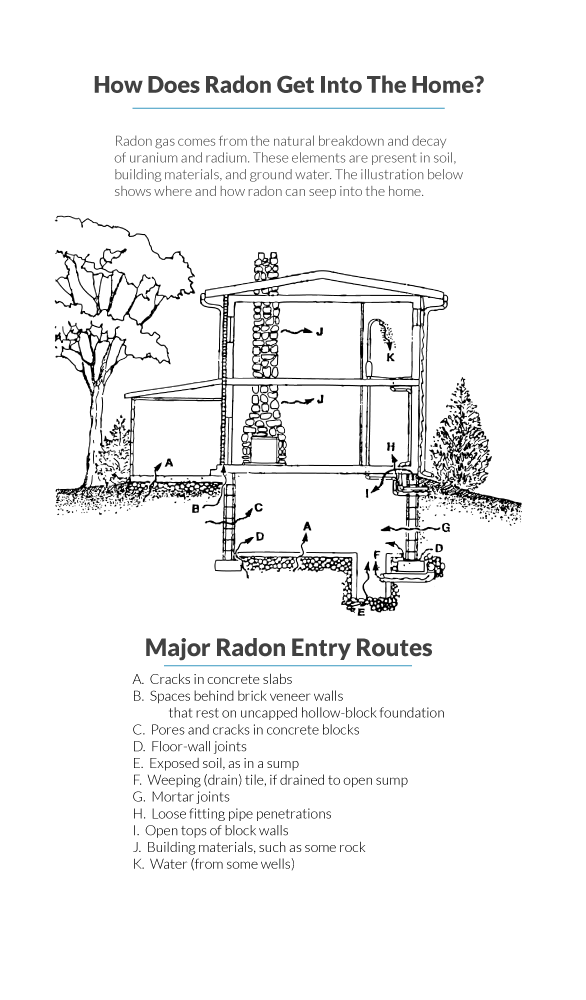
Reader Question: Our home is currently “for sale” and a prospect has visited the house several times. They asked us if we ever tested the house for radon gas, and we have not. They want us to have the house tested, but we have heard conflicting stories about radon. What can you tell us about radon? And what should we do regarding their request? Walter O.
Monty’s Answer: Hello Walter, and thanks for your question. The request for a radon inspection should be a contingency in an “offer to purchase” document presented to you by the buyer when they decide they want to buy the house. Prices vary considerably for radon tests as there are several different methods employed for radon testing. A buyer should understand the different methods and choose the method to use.
Remediation costs can vary by region, construction and finishing methods in your home, the size and design of the home and the extent to which it is finished. $500 to $2,000 would typify radon remediation costs. If they make an offer, you will have to decide the course of action when you have a specific request. It is a point of negotiation.
How small is small?
Radon is a radioactive gas, which occurs in nature and has always been present in the air. You cannot see it, taste it or smell it, and it can be detected only with specialized testing equipment. If you are curious, the US Army Corps of Engineers provides a great explanation of how small a picocurie is on this link.
Some homes throughout the United States have high radon levels. The Environmental Protection Agency (EPA) believes exposure to such levels over long periods can cause increased risk of lung cancer. Research indicates the levels of radon in homes can vary significantly with a variety of factors such as soil conditions, the “tightness” of the home and openings through which radon is absorbed.
How does radon get into a home?
Radon comes from the natural breakdown and decay of uranium and radium, which are present in the soil, building materials and groundwater.
Radon test methods vary from day to day in a home, and the levels of radon will change. Unfortunately, because the reliability of testing and multiple theories on procedures, the science has not been developed far enough at this point to provide conclusive information. The EPA recommends that you make follow-up measurements before you make any final decisions about whether to undertake significant efforts permanently correcting the problem.
Statistics show
The EPA has determined that homes containing four or more picocuries are above average in risk. EPA figures indicate between one and five people would die of lung cancer if one hundred people spent 75% of their time for 70 years in homes with the reading of 4 picocuries of radon.
All EPA figures have been taken from “A Citizens Guide to Radon” updated in January of 2009. This link to the EPA Website demonstrates the pattern of Radon levels in homes detected throughout the country.
Reduce the risk
Your risk of lung cancer from exposure to radon depends on the amount of radon entering your home and the length of time you are exposed to it. There are steps you can take to reduce your exposure to radon gas that may be in your home:
● Spend less time in areas that may have high radon content like the basement.
● Whenever possible open all windows and turn on fans to improve the air flow throughout the house.
● If your home has a crawlspace keep the vents open on all sides.
● Seal cracks and openings in the basement floors and walls.
In nearly all cases, elevated radon measurements can be reduced to acceptable levels. It usually boils down to how much it will cost to correct the situation.
Controversy
There are unanswered questions and conflicting answers regarding radon gas. Controversy has arisen concerning testing and levels of concern. Because of this, here are two opposing/information links to start your review.
It becomes your prospect’s responsibility to gather the facts about radon and then draw their own conclusions. We are aware of no law requiring radon testing in homes. Some states do require a disclosure responsibility on the part of the home seller when it comes to radon; none requires inspection or remediation. Consider forwarding this information to the potential buyer or your real estate agent.

Leave a Reply
You must be logged in to post a comment.